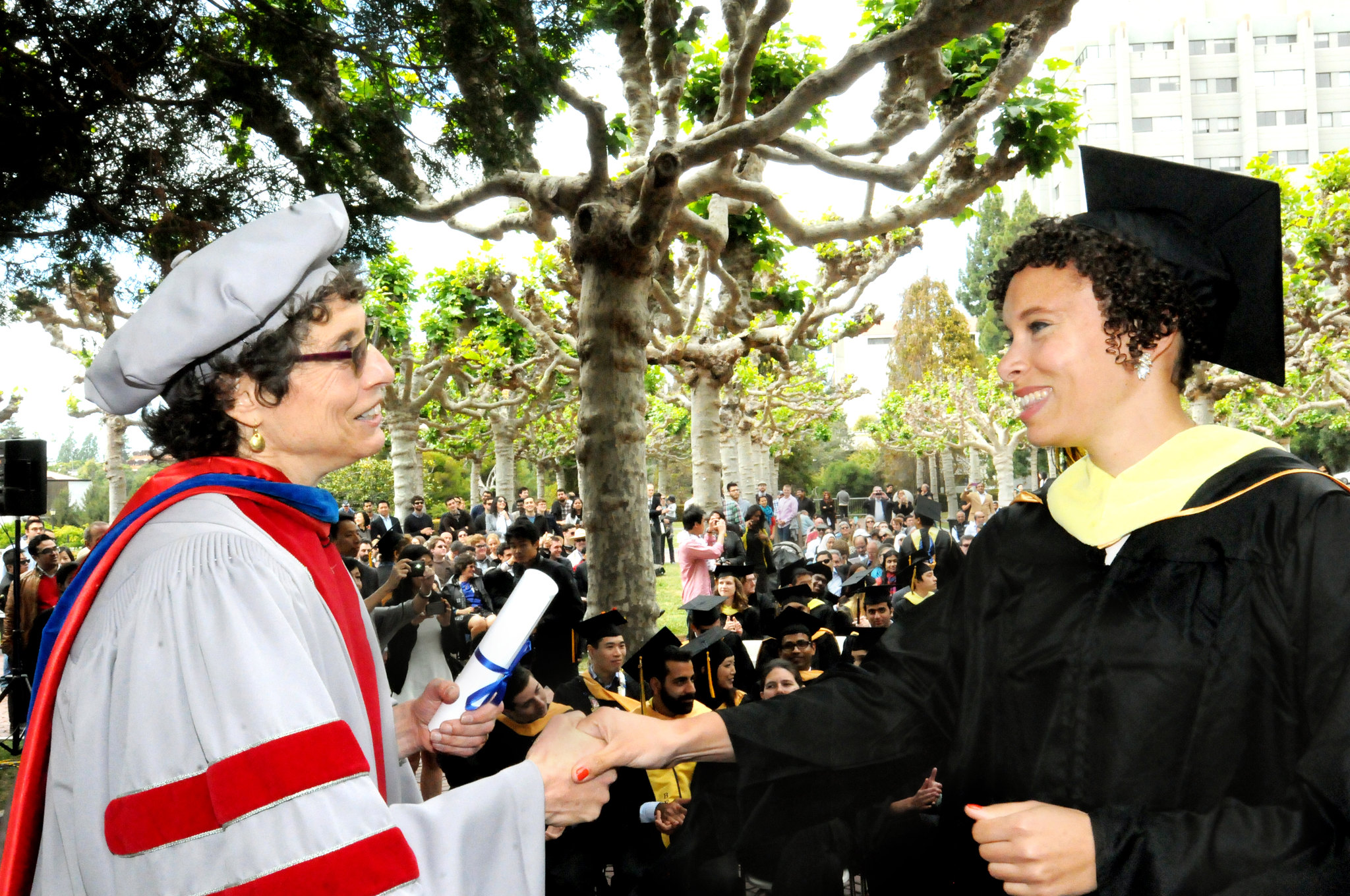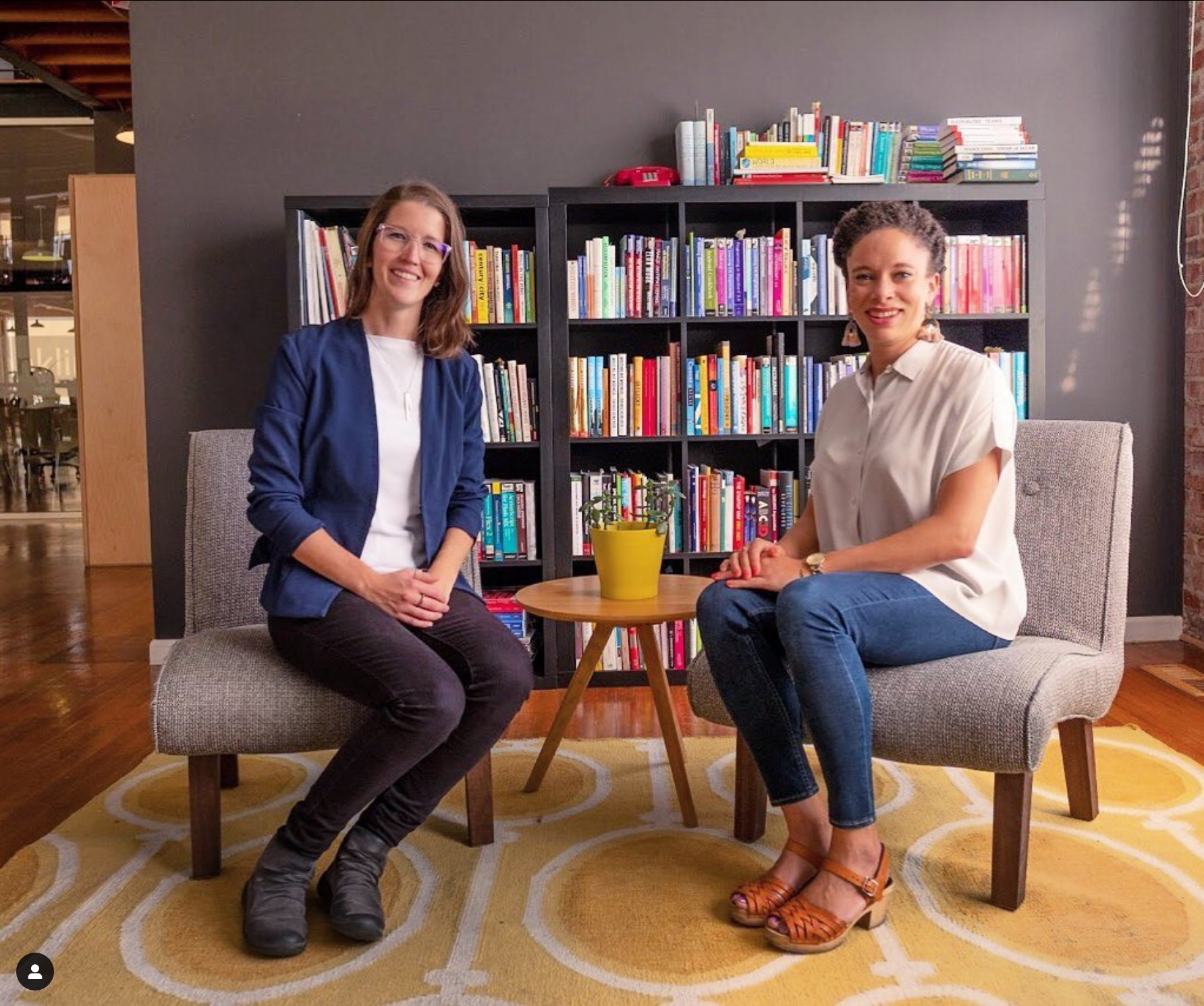Meredith Hitchcock graduated from the School of Information with a Master of Information Management and Systems in 2015. Prior to the I School, she received her Bachelor of Arts in Literature from Yale University. Following graduation, she co-founded RideAlong, a software tool to help government staff support stigmatized and vulnerable citizens. She’s currently head of UX research at the nonprofit Airbnb.org.
Why did you choose the I School?
I chose the I School for three reasons: the interdisciplinary coursework, the focus on the ethics of technology, and the proximity to Silicon Valley. I was drawn to classes like Tangible User Interfaces, Applied Behavioral Economics, and Information Visualization. I saw multiple opportunities for me to get out of my comfort zone and build both deep and broad knowledge for a future career in UX research. I also appreciated that the I School invests in creating responsible technologists: The courses ask not just what should we build but also what is the most responsible way to build it and should we build it at all? And finally, the proximity to Silicon Valley meant it would be easier to meet people who could guide me in my career and to work with companies on school projects.
What was your focus at the I School?

I came to the I School with the goal of transitioning into a career in UX research. But attending the I School was also an opportunity to focus on a topic that I’d been interested in for years: the future of reading. I was a Literature major in undergrad, I was fascinated by digital and experimental literature, and I had worked at Google Books. I took multiple classes, like Interface Aesthetics, that would help me think about what the future of reading could be. What could books be like if more of them were written for digital environments rather than paper? What new creative opportunities might open up? For our capstone project, my group prototyped platforms to help writers create digital-first books and for readers to read them.
What was the I School’s advantage?/Favorite things about the I School?
My favorite thing about the I School was and is the community. The I School classes helped me transition into UX research, but the community broadened my understanding of what technology could do. Both alums and my classmates were so passionate about so many different things: cybersecurity, reducing bias in software, creating software for musicians, etc.
A fellow I School alum, Laura Ellena, encouraged me to apply for a UX fellowship at the civic tech nonprofit Code for America after graduation. Without Laura, I never would have applied for that job. And I never would have started the company, RideAlong, that came out of my fellowship work. The I School community is the reason I now have a career in technology for social impact.
What advice would you give your past self as a MIMS student?
Take a couple of classes outside of the I School. One of the great resources I didn’t take advantage of was the ability to learn from other fields. If I had it to do again, I’d try to take 1-2 classes from the business school, law school, or Environmental Design.
You’re currently a UX Researcher at Airbnb.org. Tell us what you love about UX research, or why it’s important to you.
I see UX research as a form of advocacy work. It’s a way to make sure the context, experiences, and perspectives of the people you’re trying to serve are at the forefront during product development. And with practices like co-creation and participatory design, research is a way to make sure we’re building with communities, not for them. People from historically marginalized communities, in particular, have an experience gap at both extremes: they’ve had many bad solutions designed “for” them without their input. And they’ve also been forgotten or deliberately excluded from design processes. UX research can help to reduce that gap.
I also enjoy the way research empowers teams to make informed decisions and feel more connected to the work. It’s rewarding to share research and have teammates feel energized, to have them come up with new ideas. UX research is also a great career for someone who’s curious: I’m constantly meeting new people, constantly being surprised, and constantly learning.
You’re an award-winning mentor in our I School mentorship program. Why do you volunteer your time as a mentor?
Mentorship has been critical at multiple points in my career. A mentor is the reason I applied to the I School and a mentor is the reason I felt brave enough to co-found a startup. I’ve benefited from mentors’ feedback and advice related to stakeholder management, negotiation, public speaking, preparing for interviews, brainstorming how to approach tough research problems – the list goes on. Mentors who are women of color have been particularly helpful, but also difficult to find.
Mentoring students at the I School is a way for me to pay it forward.
Can you share any thoughts on how your identity has shaped your path, contributing to challenges and opportunities, or unique skills, strengths, or perspectives that you bring?
As a mixed-race woman, I navigate a world that wasn’t designed for me on a daily basis. And I’ve spent the majority of my career as the only person who looks like me in a given room. In my Y Combinator class of 300 founders, about 30 founders were women and 3 were Black women. At the first group dinner, another founder asked me, “Do you have a business plan?” The question wasn’t what our business plan was, but whether we had one at all. I stewed over the casual underestimation for a long time.
Facts and interactions like these have been frequently discouraging. But I also know I’m not alone in having experiences like these. One response I’ve had to these experiences is to try to lift up other women as I rise: mentorship, coffee chats, introductions. Another way I’ve tried to make something of these experiences is to emphasize intersectional research and design in my work, and to be vocal about it.
“When I dare to be powerful—to use my strength in the service of my vision—then it becomes less and less important whether I am afraid."
— Audre Lorde, The Transformation of Silence into Language & Action
After the I School and prior to your current role, you co-founded and sold a YC-backed public interest tech startup called RideAlong. Can you share any takeaways from that experience?

- Be passionate about the problem you’re trying to solve. Ask yourself, “Do I care enough about this problem to potentially work on it every day for a decade?” Another startup founder told me this early on, and it’s still one of the most resonant pieces of advice I’ve received. I’m passionate about criminal justice reform, and believing that the work I was doing could have a meaningful impact was what kept me going when I was tired or the work felt too difficult.
- Build a community of people who will listen and support you. I wouldn’t have made it without friends who met me at the airport after tough business trips, let me bounce ideas off of them, and encouraged me when I was feeling frustrated.
- Know your audience. One of the most important pieces of work we did at RideAlong was to improve our storytelling. Naturally, a police chief, a mayor, and a potential investor all care about different things. It was critical for us to understand what story would matter to each audience and how to tell it. Understanding what framing and what level of detail to use is still key to my work now.
I could see myself starting another company or a nonprofit in the future, but I consider myself an intrapreneur for now.
What was your favorite class?
I still think about many of my classes and use what I learned in my work today. If I had to pick two favorites:
Applied Behavioral Economics, taught by Professor Steven Weber. It taught me to look at the world around me in a new way, both at work and in my personal life. How is this app trying to get me to return every day? Do I actually want to buy more pandemic athleisure, or did the ecommerce site just create scarcity by claiming they’re running low on my size? Is it responsible to “nudge” someone in this context?
User Experience Research. I remember one of the first assignments was to ride BART and observe how people were interacting with the trains, the stations, the turnstiles, etc. That early assignment of being forced to look—not just listen—and tell a story about what I learned made me really fall in love with the work. I saw the informal systems people created to make the crowds manageable; I noticed the bumpy, yellow rubber strips on the BART platforms designed to help low-vision and blind passengers navigate stations; and I observed people’s body language on the train. It brought home the potential power of UX research. I saw how the skills I was learning to understand people’s behaviors and needs in various contexts could help lead to better, more empathetic design.









